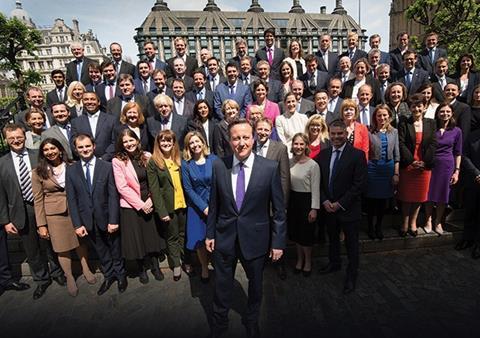Few pundits thought any party would gain a clear majority that would allow them to implement their manifesto after last week’s election. But, following a surprise result which leaves the Tories free to rule without coalition partners, what can construction expect from the next parliament?

After a surprise election success the new Conservative government has pledged to implement its manifesto “in full”. What will that mean for the construction industry?
George Osborne is widely expected to deliver an emergency budget in the coming weeks which should outline where some of the funding for the policies will come from, but it will be a tough job funding manifesto commitments which, until last Friday, were viewed more as a starting point for negotiations than a concrete programme for government.
To help you understand what to expect from the next five years, Building has compiled this brief analysis of what has been promised, what are the big remaining questions, and who are the winners and losers following last week’s shock result.
Key Tory election promises
Infrastructure
In transport, the Conservatives will flesh out their plans to push ahead with HS3 and have committed to electrifying the Great Western Main Line and the Midland Main Line from London to Sheffield. In roads, there are expected to be improvements to the M5, M1 and M6, as well as the A358, A30, A11, A47 and A303 - including tunnelling around Stonehenge in Wiltshire.
In science, the government will invest £6.9bn in the UK’s research infrastructure up to 2021, including £2.9bn for a Grand Challenges Fund, which facilitates investment in major research facilities such as the new Alan Turing Institute.
Rural broadband is also expected to be given a boost, with £790m pledged to extend superfast broadband to rural areas.

Apprenticeships
The Conservatives have put forward proposals to support 3 million new apprenticeships across the lifetime of the next parliament, and will give employers more control over apprenticeship courses to identify and develop skills more relevant to the workplace.
Schools
The main campaign pledge for the construction industry regarding education is the proposal to open at least 500 free schools, which will provide an expected 270,000 new school places.
Housing
The key Conservative policy on housing revolves around extending the right to buy to housing association tenants, which would allow up to 1.3 million more homes to be bought by their current tenants. The government can be expected to release further details of the £1bn brownfield fund which was announced in the Budget in the coming months.
In planning, the Conservatives have vowed to protect the Green Belt and to put local people “at the heart of the planning system”. The government will deliver new garden cities if they are “locally led”, such as Ebbsfleet and Bicester, and build 200,000 starter homes which will be sold at a 20% discount. These will be built exclusively for first time buyers under the age of 40.
In a move that addresses the decline of small housebuilders, custom-built homes are given special mention in the Conservative manifesto with the proposal for a new right to build, which requires councils to allocate land to local people to build or commission their own home.
Four unanswered questions

1. Davies commission
David Cameron has promised a swift resolution to the long-delayed decision over new airport capacity in the South-east of England. Sir Howard Davies’ Airports Commission is due to report in the next few weeks, with a government decision due over the summer.
However, the signs do not look promising. Last month it emerged that the Department for Transport has appointed merchant bankers Rothschild to scrutinise the finances behind the Heathrow and Gatwick bids that Davies is considering - which could be a whole new way to delay making a final choice.
The appointment to Cabinet of arch Heathrow opponent Boris Johnson this week has also raised eyebrows, as it is unclear if he would be happy to continue in a Cabinet that gave the controversial £18bn scheme the nod, though he has ruled out stepping down as an MP.
One industry source close to the government says: “The airports decision is politically really difficult. It’s very hard to see Boris being in a Cabinet that approves it while he is still London mayor. Cameron may look for cover to allow him to put it off.”
2. Zero carbon
In advance of the 2010 election, then shadow housing minister Grant Shapps said that he would “sort” the definition of zero carbon homes within weeks of entering government. The reality is the definition is still not tied down five years later - though of course progress toward the 2016 target first laid down by New Labour has been made, including on the concept of allowable solutions.
However, the testimony of Liberal Democrats within the Conservative/Liberal Democrat coalition is that all of the progress was made in the teeth of fierce opposition, from their Conservative coalition partners, led by the Treasury, raising the question of whether the target will be met. The manifesto does not mention it.
Former Labour construction minister Nick Raynsford believes it should now be considered under threat. “There is no question that the ending of the Code for Sustainable Homes and the opt outs for small sites will provide loads of loopholes for housebuilders to wriggle through. There is no energy to pursue the zero carbon agenda properly,” he says.

3. Devo max
Further devolution of taxation and spending powers to the nations and regions of the UK is seen by many as important in allowing capital investment in towns and cities outside of London and the South-east.
However, while the Scottish result will add impetus to calls for greater powers to be devolved, the extent of devolution to city regions and localities in England remains unclear.
Richard Threlfall, head of construction at consultant KPMG, says: “Northern cities will acutely feel the competitive pressure from Scotland if it is allowed to invest in its own growth but they are not. Devolution would create opportunities to invest far more in the regional growth of our cities. We need to know where we really stand on fiscal devolution.”
4. Capital spend
In the last parliament a number of spending pledges were made running over the course of the parliament: £3.3bn for “affordable rent” housing to 2018, £21.5bn for new schools, and £28bn on the biggest road building programme since the 1970s and greater investment in rail.
However, the overarching financial targets the government has to hit are very stretching and, unlike Labour and Liberal Democrat proposals, include capital spend on investment as well as current spending, thereby implying strict limits.
The industry source says: “Given the pressure on public finances, the major question is whether the government is going to see through its commitments on major capital projects.”
Raynsford says: “I’d be very nervous of these pledges indeed. The scale of the cuts proposed will be very hard to achieve.”
Who will gain or lose from Tory policies?
Winners
Housebuilders
Housebuilders joined estate agents as big stock market winners in the post-election landscape, seeing a share price rise which averaged 6.5% in the aftermath of the election result. Shares in Taylor Wimpey, Bellway, Redrow and Bovis Homes Group all rose, with Berkeley Group adding almost 10% to its stock market value in the day after the surprise Conservative victory. One factor behind the share price rise is the fact that a Conservative majority will give firms a stable government for the next five years, which the markets generally respond well to. However, the private rental market will receive a boost now that Labour will not be able to implement its proposed rental cap. The win confirms the continuation of the government’s popular help to buy schemes, and is a boost to those selling to overseas buyers worried about the introduction of a mansion tax and the abolition of non dom status. Estate agents reported £500m of offers on London property on the day after the election.
High Speed Rail
With the High Speed Rail bill making its way through parliament staff at HS2 can feel relieved that the mammoth project hasn’t been kicked around like a political football in any post-election negotiations. The project is likely to be pushed through with cross-party support despite Cameron enjoying a slim majority in the Commons and the plans being opposed by many Tory backbenchers. Chancellor George Osborne has paved the way for development of the trans-Pennine “HS3” project as the centrepiece of his Northern Powerhouse vision, and backed the link between Manchester and Leeds in the Budget in March. Even without accounting for either project, Network Rail is already on course for the largest investment in its network for a generation over the next five years. Many of the Conservative manifesto pledges look to be lifted directly from Network Rail’s own infrastructure plans.
Road builders
Road contractors can also look ahead positively to the infrastructure programme in the next parliament, which Osborne has previously described as the biggest road-building programme since the 1970s.
Highways England recently revealed the delivery plans for its £11bn investment strategy up to 2020 which will now go ahead. Kier boss Haydn Mursell can feel vindicated in his decision to acquire road engineering business Mouchel, which places the firm in a good position to win work from Highways England’s valuable trunk road and maintenance frameworks.
Losers
Housing associations
The Conservatives’ plans to extend the right to buy has been vociferously opposed by housing associations and we can expect the issue to be one of the most contentious of the next parliament.
Some housing association chiefs have already vowed to fight the plans in court and industry commentators have said that forcing charities to sell off their stock will need new laws as well forcing their existing debt (which is estimated at £60bn) back on the government’s balance sheet.
Housing association chiefs, meanwhile, have already been attacked for being “fat cats” in the press. Whether the appointment of Greg Clark as secretary of state for communities and local government will have any effect remains to be seen but many expect a battle over this issue.
John Armitt
After conducting a wide-ranging review of long-term infrastructure planning, John Armitt’s recommendation to establish an independent infrastructure commission had been adopted as a manifesto pledge by the Labour Party.
The commission had been expected to take a long-term view of UK infrastructure priorities up to 30 years ahead, and included reassessing the nation’s infrastructure needs every 10 years. However, after Labour leader Ed Miliband failed to win the election these plans are highly unlikely to be adopted by the Conservatives.
The Green construction lobby
At first glance the removal of Liberal Democrat energy secretary Ed Davey and the Conservative manifesto pledge to all but halt onshore wind farms is bad news for the Green lobby. However, new energy secretary Amber Rudd is a firm believer in tackling climate change and previously served as minister for climate change in the coalition government.
Top of Rudd’s to-do list will be to conclude the negotiations for the new Hinckley Point nuclear power station and to continue talks over the strike price for Swansea Bay’s tidal lagoon project. A firm believer in Thatcherite market-economics, Rudd may find solving the nation’s issues with energy efficiency difficult to solve, especially after the market-led Green Deal was criticised as a flop.


























No comments yet